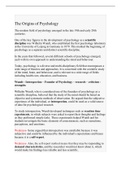The Origins of Psychology
The modern field of psychology emerged in the late 19th and early 20th
centuries.
One of the key figures in the development of psychology as a scientific
discipline was Wilhelm Wundt, who established the first psychology laboratory
at the University of Leipzig in Germany in 1879. This marked the beginning of
psychology as a separate and distinct scientific discipline.
In the years that followed, several different schools of psychology emerged,
each with its own approach to understanding the mind and behaviour.
Today, psychology is a diverse and multi-disciplinary field that encompasses a
wide range of theories and approaches. It is concerned with the scientific study
of the mind, brain, and behaviour, and is relevant to a wide range of fields
including health care, education, and business.
Wundt - Introspection – Founder of Psychology – research – criticism -
strengths
Wilhelm Wundt, who is considered one of the founders of psychology as a
scientific discipline, believed that the study of the mind should be based on
objective and systematic methods of observation. He argued that the subjective
experience of the individual, or introspection, could be used as a valid source
of data for psychological research.
To study introspection, Wundt developed techniques such as reaction time
experiments, in which subjects were asked to report their thoughts and feelings
as they performed simple tasks. These experiments helped Wundt and his
students investigate the basic elements of consciousness, such as sensations,
perceptions, and emotions.
Weakness- Some argued that introspection was unreliable because it was
subjective and could be influenced by the individual's expectations and biases
because it is a self-report.
Weakness- Also, the self-report method means that they may be responding to
demand characteristics, and the researcher would not know about it, which
would make his findings less reliable and less scientific.
, Strength- Despite this criticism, Wundt's work laid the foundation for the
development of many important psychological theories and techniques that are
still used today.
Research Strength- Some of his work was well-controlled, which made it
scientific. The lab environment also ensured that possible extraneous variables
were not a factor.
Strength- Procedures and instructions (He and his co-workers recorded their
experiences of various stimuli they were presented with, such as objects or
sounds, and they categorised their observations into thoughts, images and
sensations) were standardised, which makes it reliable and allows for
comparison across different samples and results.
Key Terminology
Scientific Discipline: Previously, psychology had been seen as a branch of philosophy.
Introspection: the examination of one's own conscious thoughts and feelings.
Wundt’s Reaction Time Experiment: He tried to assess the speed of thought by measuring
how long it took test subjects to make a judgment
Self-Report: methods of gathering data where participants provide information about
themselves without interference from the experimenter (e.g., questionnaires, interviews,
diaries).
Demand Characteristics: cues in a study that might indicate the study aims to participants.
These cues can lead participants to change their behaviours or responses based on what they
think the research is about.
Extraneous Variable: an uncontrolled variable that they are not measuring but may be
affecting results.
Standardised: The process in which procedures used in research are kept the same. Great
attention is taken to keep all elements of a procedure identical.





